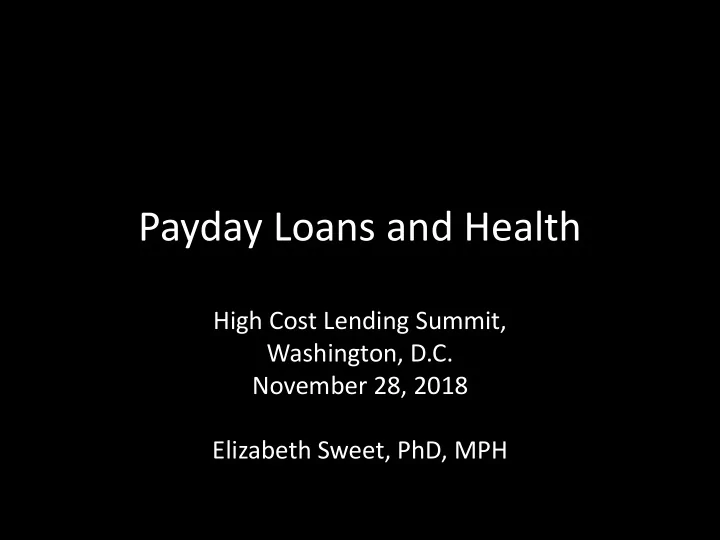

Payday Loans and Health High Cost Lending Summit, Washington, D.C. November 28, 2018 Elizabeth Sweet, PhD, MPH
What is an epidemiologist doing here? Health reflects economic status Expected Age at Death vs. Household Income Percentile By Gender at Age 40 90 Women 85 Men Expected Age at Death 80 75 70 0 20 40 60 80 100 Household Income Percentile Chetty et al., 2016 JAMA
How do inequities enter the body? Health care? Diet and Lifestyle? Smoking? STRESS Stress predicts heart attacks better than many conventional risk factors Clinical risk factors Psychosocial Stress Healthy behaviors From INTERH ERHEA EART RT Stud tudy y in 5 52 2 countri ntries es, Rozans anski ki et al 200 005. 5.
Debt is stressful. Is it associated with worse health? Type of Health Outcome Number of Studies Types of Debt Measures Mental Health (Depression, 12+ Total $, income ratio, mortgage Anxiety, etc.) delinquency, self-assessment, any debt Life Expectancy 1+ Unsecured and mortgage General Health (self-report) 5+ Debt to income ratio, credit card debt, mortgage debt, self- assessment Physical Health (biomarkers, 4+ Same as above obesity, etc.) Evidence is building. Lots of variation in the measurement of both debt and health outcomes.
Short-term loans and health Sweet et al., 2018
Short-term loans and health % Difference between STL and non-STL Borrowers 70% 60% 50% 40% 30% 20% 10% 0% SBP BMI Waist CRP # Phys. # Sexual Anxiety Circ. Symp. Symp. Compared to those who had never had a short-term loan (STL), Sweet et al., 2018 STL borrowers had significantly higher: • • blood pressure self-reported physical and • body mass (obesity) sexual symptoms • • C-reactive protein anxiety
Biggest takeaway: payday loans are disease risk factors • Effect sizes are consistent with those seen in other health inequities research • Effects on biomarkers and physical health measures are particularly strong • The effect on CRP is especially notable – CRP is a measure of inflammation and cardiovascular risk – Unlike non- STL borrowers, STL borrowers’ CRP puts them in an ‘intermediate risk’ category for heart disease
Limitations of the study… • Direction of causality not explored – Need longitudinal data to sort this out • Mechanism linking STL to poorer health needs more study – BUT psychosocial stress is the strongest theory – And is supported by qualitative data from this study…
Qualitative findings… “I feel like I’m a bad person because I can’t pay this off.” “[I feel] horrible, like a loser, just like crap.” “[You feel] like you failed at life. I just want to cry, I feel suffocated, I feel like I can’t breath. You feel like less of a person.” These feelings about debt were also strong, independent predictors of poor health…
What’s next? • This study was born from a health inequities perspective – not designed with an eye toward data that is most policy relevant – What do policy and consumer advocates need from researchers? – What data can epidemiologists provide that will be most helpful? – What formats and/or venues are most helpful for reporting that data? – What else can we do to better facilitate dialogue, collaboration, and action?
Some references… • Sweet E, Kuzawa C, McDade TW. Short-term Lending: Payday Loans as Risk Factors for Anxiety, Inflammation, and Poor Health. SSM – Population Health. 5: 114-121. • Sweet E. “Like you failed at life”: Debt, Health and Neoliberal Subjectivity. Social Science and Medicine. 212: 86-93. • Sweet E, Stanley F, DuBois LZ. Embodied Neoliberalism: Epidemiology and the Lived Experience of Consumer Debt. International Journal of Health Services. 48(3): 495-511 • Sweet E, Nandi A, Adam EK, McDade TW. The High Price of Debt: Household financial debt and its impact on mental and physical health. Social Science and Medicine, 91: 94- 100
Recommend
More recommend